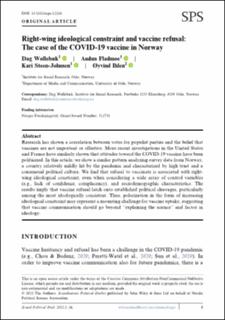Right-wing ideological constraint and vaccine refusal: The case of the COVID-19 vaccine in Norway
Peer reviewed, Journal article
Published version
Permanent lenke
https://hdl.handle.net/11250/2987562Utgivelsesdato
2022Metadata
Vis full innførselSamlinger
- Publikasjoner fra CRIStin [715]
- Tidsskriftpublikasjon [388]
Originalversjon
10.1111/1467-9477.12224Sammendrag
Research has shown a correlation between votes for populist parties and the belief that vaccines are not important or effective. More recent investigations in the United States and France have similarly shown that attitudes toward the COVID-19 vaccine have been politicized. In this article, we show a similar pattern analyzing survey data from Norway, a country relatively mildly hit by the pandemic and characterized by high trust and a consensual political culture. We find that refusal to vaccinate is associated with right-wing ideological constraint, even when considering a wide array of control variables (e.g., lack of confidence, complacency), and sociodemographic characteristics. The results imply that vaccine refusal latch onto established political cleavages, particularly among the most ideologically consistent. Thus, polarization in the form of increasing ideological constraint may represent a mounting challenge for vaccine uptake, suggesting that vaccine communication should go beyond “explaining the science” and factor in ideology.
